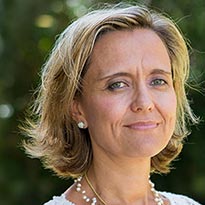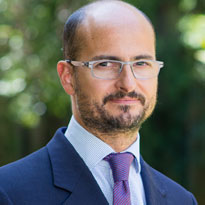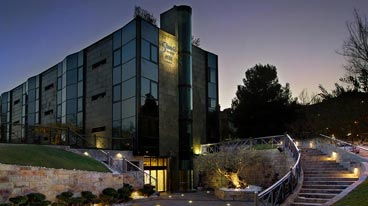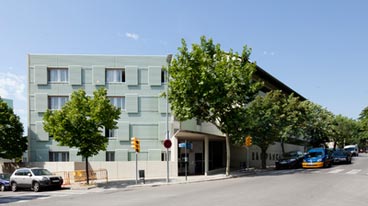The Future of Work: Promoting Dignity and Human Flourishing
21st International Symposium on Ethics, Business and Society
Given the current circumstances, the symposium will be held in a hybrid format (face to face or online) during the afternoons and evenings of July 12th and 13th CET (please find below the schedule).
Rationale
Work is a central element in human life and business organizations. In the past, it has drawn attention from different academic disciplines, including business ethics. Current studies cover a broad scope of issues from personal, organizational and social dimensions. However, many questions remain open in the conversation about human work and further research is necessary.
The year 2020 has been marked by the extraordinary experience of the pandemic, which has paralyzed the entire world. The health crisis has had multiple ramifications in different areas of social and economic life, including work. In many cases, businesses have reorganized job content and job dynamics. Many companies have reduced their workforce. The health crisis will be followed by economic and social crises, the scale and effects of which are unpredictable. In contrast, some professions have been indispensable in the fight against the pandemic and for access to people’s basic needs, highlighting the importance of the social dimensions of work.
Throughout history, all philosophical schools, as well as cultural and religious traditions, have offered visions of the meaning of work (Arendt, 1958). Although the responses –from the ancient philosophers to Adam Smith or Karl Marx – have differed, the underlying theme has always been to what extent work influences, and at the same time is an expression of, the dignity of the human person and contributes to human flourishing. The Catholic Social Doctrine has also contributed to the concept of work (Pontifical Council for Justice and Peace, 2004; Melé, 2018).
Human work has many expressions, affects many aspects of human life and generates diverse dynamics in social life and companies. Topics that can be subjects of ethical discussions are many. Moreover, they change over time, and according to social and cultural contexts. Unemployment affects many societies and has even worsened with the pandemic. Precarious employment and differences in income may cause growing inequalities and generate situations of social conflict. In many places, and particularly in developing countries, working conditions are far from reflecting decent work, which is a tenet of the UN Sustainable Development Goals. Work is also related to other issues promoted by the SDGs, such as responsible consumption and production; the fight against poverty; health and well-being: clean energy; gender equality; and peace and justice.
On the other hand, new forms of work, such as the collaborative economy, or the use of new technologies (Industry 4.0), generate or favor new working conditions, which require careful analysis from an ethical perspective. Furthermore, concepts such as meaningful work, developmental work and spirituality at the workplace are gaining momentum and contribute to enriching the content and meaning of work. Finally, the discussion about the significance of work is inevitably linked to the purpose of business.
Tracks
The 21st IESE International Symposium on Ethics, Business, and Society focuses on the future of work, with special attention given to how the human dignity of people and the dignity of work should be respected and promoted, and how human flourishing may be fostered at the workplace and in the design of organizations, along with other related topics. Although any conceptual or empirical paper related to the general theme of the symposium is welcome, we suggest the following tracks.
The dignity of work has been recently emphasized from secular (Pirson, 2017, Donaldson and Wash, 2015) and religious (Sison et al., 2016) perspectives. However, in practice, this dignity is not always respected, either for cultural reasons (e.g., Mahalingam et al. 2019) or as a consequence of certain premises adopted by social science (Agassi, 1986), including a reductionist economic view of business (Ghoshal 2005).
The dignity of work is associated with human dignity, a concept with a long history that begins prior to the Renaissance period up to contemporary declarations of human rights, through Kant and the Illustration, and personalist philosophers. In addition to the objective character of dignity, a subjective meaning of dignity has been introduced by organizational psychology (Lucas, 2017). Despite these efforts, a sound theory of workplace dignity (Thomas and Lucas, 2019) is still missing. We welcome contributions that are built on solid epistemological, anthropological and ethical grounds.
Respecting the dignity of work has many practical implications, including subjective factors (meaningful work, autonomy, respect) and objective factors (job security, financial reward, equality of opportunity, and safe and healthy working conditions) (Bolton, 2007). Labor rights are an appropriate response to the human dignity of workers, although they may not exhaust the demands of dignity regarding labor (Gilabert, 2006). Fostering professional and human development (Melé & Dierksmeier, 2012) or respecting spirituality at the workplace (Melé & Fontrodona, 2016) are also relevant aspects related to human dignity. These topics allow both empirical and conceptual contributions.
In some environments, and particularly in developing countries, working conditions are still deplorable (Arnold & Bowie 2007) and far from being “decent work,” which has been advocated by the International Labor Organization (ILO) since the end of the 20th century, and is now included among the UN Sustainable Development Goals (SDGs) (United Nations, 2015). Decent work is a comprehensive concept that refers to labor rights but that may also include other aspects (Benedict XVI 2005, n. 63). Many of the other SDGs have a direct or indirect reference to decent work. Therefore, work is a transversal concept that may be used to evaluate the implementation and achievement of the 2030 Agenda. In the current context, issues related to safety and healthy environments have become especially relevant.
Virtues can be related to meaningful work and behavior (Beadle & Knight, 2012). Virtues are central to human flourishing (Fontrodona and Sison, 2015) and a significant number of virtues apply to human work. Relevant virtues for work include industriousness, diligence, courage, order, constancy, self-discipline, humility, magnanimity, companionship and concern for other people, among many others. Some of these have been studied, but many others require further examination, including their relevance for the future of work.
New technologies and Industry 4.0 generate or favor new working conditions, which call for a careful analysis from the perspective of work dignity and human flourishing. New technologies may destroy jobs and create new ones (Schwab, 2017; Baldassari and Roux, 2017; Rainnie and Dean, 2020). Industry 4.0 will alter the landscape for talent development (Karacay, 2018) and will require improvements in work conditions, work performance and work relationships (Caruso, 2018). An analysis of abuses and lack of respect for human dignity in the context of new technologies may be a good contribution. Discussions of business responsibilities and positive practices are also welcome.
Unemployment is a persistent problem in many countries, and this has only increased with the pandemic. It implies not only a cost for societies in economic terms, but, most significantly, it causes individual suffering, a loss of personal dignity and is a source of social unrest (Jahoda, 1982). Moreover, income inequality has grown in most industrialized countries, in addition to developing ones, in recent decades (Franzini, 2019). Today, having a job does not guarantee sufficient income and avoidance of social exclusion. Those situations require not only a responsible action by business but also initiatives by public policymakers. Today, for example, there is an open discussion around a universal basic income (Widerquist & Lewis, 2017). Contributions on the effectiveness and ethical aspects of such experiences are welcome.
Work ethics – understood as a set of values related to hard work, discipline, and frugality – has often been associated with the term “the Protestant Work Ethic” or, more specifically, “the Calvinist work ethic.” However, the concept of work ethics, with these or similar values, is a feature of other traditions and cultures. For instance, there are references to Islamic work ethics (Ahmad & Owoyemi, 2012) and Confucian work ethics (Yeh and Xu, 2010). These value systems deserve to be explored, particularly in the context of an increasingly global world. A possible approach is to evaluate these lists of values in the light of intrinsic human dignity and ponder how these values concur, or do not, with human flourishing.
Common human dignity requires a respectful treatment of diversity (based on gender, age, ethnicity, disabilities or any other dissimilarities among the workforce), positing the ethical challenge to overcome unfair discrimination and notorious inequalities at the workplace. Moreover, there are many positive aspects of diversity in the workplace that should be highlighted and promoted (Foma, 2014; Chrobot-Mason & Aramovich, 2013). Beyond current organizational studies, more work is required to conceptualize diversity from an ethical perspective (e.g., Frémeaux, 2020) and implement ethical practices on diversity at the workplace (e.g., Ng and Sears, 2020).
Work can empower women, as well as other socially marginalized groups. This challenge is particularly significant in developing societies, where women do much of the work; enabling them to run their businesses and become part of the cash economy, through such techniques as microfinance, can be a powerful force for liberation and proper education of the next generation (Cornwall, 2016; Karwati et al., 2018).
Work-family balance plays an important role in individual and organizational well-being, and also for societies at large. There is abundant literature on balancing work and family responsibilities, which generally emphasize negative or problematic aspects from psychological and organizational perspectives (Marchese et al. 2002). However, there is a growing interest in more positive views, such as “Work-Family Enrichment” (Greenhaus & Powell, 2006; Shein & Chen, 2010), whereby experience or participating in one role increases the quality of performance in the other.
The purpose of business is under discussion. The importance given to work can vary, depending on how purpose is defined: from approaches that give work a more instrumental character to other proposals that relate work to the common good of the firm (Sison & Fontrodona, 2012; Pinto Garay, 2015). Companies with a social purpose may give more importance to work. On the other hand, as the self-employed sector is growing, work orientation, job content, and well-being may differ between self-employed and organizationally employed workers (Warr & Inceoglu, 2018). Especially in developing countries, but also in new forms of business, artisan work highlights the vocational sense of craftmanship (Pantea, 2019). Theoretical contributions on the purpose of business and practical experiences in new forms of business related to work are welcome.
The symposium will take place in 2021 and this year marks the 40th anniversary of the Encyclical letter Laborem Exercens by John Paul II (1981), an important milestone in the ethics of work. This document places a strong emphasis on the dignity of work and human flourishing and provides solid motives for meaningful work. Some concepts and ideas on work raised by the text may shed light on ongoing discussions in our current context and, more specifically, in the Fourth Industrial Revolution (Melé, 2020). Among other topics, this document deals with the subjective dimension of work, the inherent dignity of all work, work alienation, work and family life, primacy of work over capital, human rights in the context of labor and spirituality at the workplace (Melé, forthcoming). Philosophical and theological perspectives on human work and practical aspects within the organization and the socio-economic context are welcome.
Agassi, J. B. (1986). “Dignity in the Workplace Can Work Be Dealienated?” Journal of Business Ethics, 5(4), 271-284.
Ahmad, S., & Owoyemi, M. Y. (2012). “The Concept of Islamic Work Ethic: An Analysis of Some Salient Points in the Prophetic Tradition.” International Journal of Business and Social Science, 3(20), 116-123.
Arendt, H. (1958), The Human Condition, Chicago, IL: University of Chicago Press.
Arnold, D. G. & Bowie, N. E. (2007). “Respect for Workers in Global Chains: Advancing the Debate over Sweatshops.” Business Ethics Quarterly, 17(1), 135-145.
Baldassari, P. & Roux, J. D. (2017). “Industry 4.0: Preparing for the Future of Work.” People & Strategy, 40(3), 20-23.
Beadle, R., & Knight, K. (2012). “Virtue and Meaningful Work.” Business Ethics Quarterly, 22(2), 433-450
Benedict XVI (2005). “Encyclical-Letter ‘Caritas in Veritate’ (love in truth).”
Bolton, S. C. (2007). “Dimensions of Dignity at Work.” In S. C. Bolton (Eds.), Dignity in and at Work: Why It Matters (pp. 3-16). Oxford, UK: Butterworth-Heinemann.
Caruso, L. (2018). “Digital innovation and the Fourth Industrial Revolution: Epochal Social Changes?” AI & Society, 33, 379–392.
Chrobot-Mason, D., & Aramovich, N. P. (2013). “The Psychological Benefits of Creating an Affirming Climate for Workplace Diversity.” Group & Organization Management, 38(6), 659-689.
Cornwall, A. (2016). “Women’s Empowerment: What Works?” Journal of International Development, 28(3), 342-359.
Donaldson, T. & Walsh, J. P. (2015). “Toward a Theory of Business. Research in Organizational Behavior,” 35(181-207. DOI:10.1016/j.riob.2015.10.002.
Foma, E. (2014). “Impact of Workplace Diversity.” Review of Integrative Business and Economics Research, 3(1), 382.
Fontrodona, J. & Sison, A. (2015). “Work, Virtues, and Flourishing: A Special Issue” from the EBEN 25th Annual Conference. Journal of Business Ethics, 128(4), 701-703.
Franzini, M. (2019). “Market Income Inequality and Welfare State Redistribution in Europe”. In Marcuzzo, M.C, Palumbo, A. & Villa, P. Economic Policy, Crisis and Innovation: Beyond Austerity in Europe, Routledge.
Frémeaux, S. (2020). “A Common Good Perspective on Diversity.” Business Ethics Quarterly, 30(2), 200-228.
Ghoshal, S. (2005). “Bad Management Theories Are Destroying Good Management Practices.” Academy of Management Learning and Education, 4, 75-91.
Gilabert, P. (2016). “Labor Human Rights and Human Dignity.” Philosophy & Social Criticism, 42(2), 171–199.
Greenhaus, J. H., & Powell, G. N. (2006). “When Work and Family are Allies: A Theory of Work-Family Enrichment.” Academy of Management Review, 31(1), 72-92.
Jahoda, M. (1982). Employment and Unemployment: A Social-psychological Analysis (Vol. 1). CUP Archive.
John Paul II (1981). Encyclical-Letter ‘Laborem exercerns’.
Karacay G. (2018). “Talent Development for Industry 4.0.” In: Ustundag, A., & Cevikcan, E. Industry 4.0: Managing The Digital Transformation. Springer Series in Advanced Manufacturing. Springer.
Karwati, L., Ansori, A., & Mulyono, D. (2018). “Women Empowerment to Build Entrepreneurship.” Journal of Nonformal Education, 4(2), 169-176.
Lucas, K. (2017). “Workplace Dignity.” In C. R. S. L. Lewis (Eds.), The International Encyclopedia of Organizational Communication (pp. 2549-2562). Chichester, UK: Wiley Blackwell.
Mahalingam, R., Jagannathan, S. & Selvaraj, P. (2019). “Decasticization, Dignity, and ‘Dirty Work’ at the Intersections of Caste, Memory, and Disaster.” Business Ethics Quarterly, 29(2), 213-239.
Marchese, M. C., Bassham, G. & Ryan, J. (2002). “Work-Family Conflict: A Virtue Ethics Analysis.” Journal of Business Ethics, 40, Part 1(2), 145-154.
Melé, D. (2018). “Meanings of Work in Catholic Social Teaching—Dialogue with ‘Meaningful Work’ in Organizational Studies.” In A. Argandoña and F. J. Insa (Eds.), Work in a Human Economy — Business and Common Good in a Changing Society. Volume IV/5 (pp. 95-113). Roma: EDUSC.
Melé, D. (2020). Valor humano y cristiano del trabajo. Enseñanzas de S. Juan Pablo II. Pamplona: Eunsa.
Melé, D. “Ethics at the Workplace in the Fourth Industrial Revolution: A Catholic Social Teaching Perspective.” Business Ethics: A European Review (forthcoming).
Melé, D. & Dierksmeier, C. (Eds.). (2012). Human Development in Business. New York: Palgrave – MacMillan.
Melé, D.& Fontrodona, J. (2016). “Christian Ethics and Spirituality in Leading Business Organizations: Editorial Introduction”. Journal of Business Ethics, 145(4), 671-679.
Ng, E. S. & Sears, G. J. (2020). “Walking the Talk on Diversity: CEO Beliefs, Moral Values, and the Implementation of Workplace Diversity Practices.” Journal of Business Ethics, 164(3), 437-450.
Pantea, M. C. (2019). “The Changing Nature and Meanings of Manual Work.”. In Pantea, M.C. Precarity and Vocational Education and Training (pp. 19-34). Palgrave Macmillan, Cham.
Pinto Garay, J. (2015). “The Concept of Work in a Common Good Theory of the Firm.” Business & Professional Ethics Journal, 45-70.
Pirson, M. (2017). Humanistic Management. Protecting Dignity and Promoting Well-Being. Cambridge University Press.
Pontifical Council for Justice and Peace (2004). Compendium of the Social Doctrine of the Church. Vatican: Vatican Press.
Rainnie, A. & Dean, M. (2020). “Industry 4.0 and the Future of Quality Work in the Global Digital Economy.” Labour & Industry, 30(1), 16-33.
Schwab, K. (2017). The Fourth Industrial Revolution. Currency.
Shein, J. & Chen, C. (2010). Work-Family Enrichment. Rotterdam, The Netherlands: Sense Publishers.
Sison, A. J. G., Ferrero, I. & Guitián, G. (2016). “Human Dignity and The Dignity of Work: Insights from Catholic Social Teaching.” Business Ethics Quarterly, 26(4), 503-528.
Sison, A. J. G., & Fontrodona, J. (2012). “The Common Good of the Firm in the Aristotelian-Thomistic Tradition.” Business Ethics Quarterly, 22(2), 211-246.
Thomas, B. & Lucas, K. (2019). “Development and Validation of the Workplace Dignity Scale.” Group & Organization Management, 44(1), 72–111.
United Nations (2015). Transforming Our World: The 2030 Agenda For Sustainable Development. New York: UN Publishing.
Warr, P., & Inceoglu, I. (2018). “Work Orientations, Well-being and Job Content of Self-Employed and Employed Professionals.” Work, Employment and Society, 32(2), 292-311.
Widerquist, K., & Lewis, M. A. (2017). The Ethics and Economics of the Basic Income Guarantee. Routledge.
Yeh, Q. J., & Xu, X. (2010). The Effect of Confucian Work Ethics on Learning About Science and Technology Knowledge and Morality. Journal of Business Ethics, 95(1), 111-128.
Important Deadlines
February 26, 2021: Paper proposal of about 1000 words, including objectives, methodology, possible findings and relevant references (Response to the authors, before March 26)
June 15, 2021: Full papers. Suggested length for papers is about 7000 words, with an abstract of about 250 words. (Authors interested in submitting their paper for a further publication should make their interest explicit in the cover page.)
July 25, 2021: Response to authors of accepted papers for a review process for publication in a special issue of Humanistic Management Journal.
Instructions
- The official language of the Symposium is English.
- Please send proposals using the paper submission platform
- For full papers, we suggest using the style guidelines of the of the Humanistic Management Journal (https://www.springer.com/journal/41463/submission-guidelines)
Further information
Logistical questions about this conference can be addressed to Ms. Esther Ribes (eribes@iese.edu), and academic questions to Professor Joan Fontrodona (jfontrodona@iese.edu).
E-mail: 21symposium@iese.edu
Website: www.iese.edu/21symposium
Scientific Committee
Scientific Committee
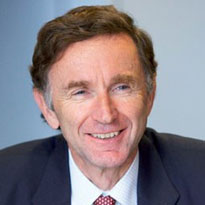

Stephen Green
Advisory BoardChair of Business Ethics


Daryl Koehn
Advisory BoardChair of Business Ethics
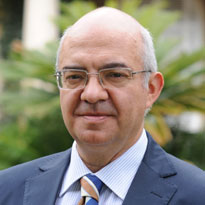

Carlos Sánchez-Runde †
ProfessorManage People in Organizations
Organizing Committee
Organizing Committee


Esther Ribes
Events ManagerCampus Experience Services
Schedule
This agenda outlines the structure of the conference, that will be organized in a hybrid format (face to face or online).
Monday, July 12th
12:45 – 13:45 – Welcome Lunch
13:45 – 14:30 – Registration
14:30 – 14:45 – Welcome Address and Introduction
Franz Heukamp, Dean of IESE Business School, Spain
Joan Fontrodona, Director of the 21st Symposium on Ethics, Business and Society
14:45 – 16:00 – Plenary Session I: Re-Thinking the Future of Work in Terms of Dignity and Human Flourishing
Work beyond Production: Rediscovering Humanity at Work
Ana Marta González, Professor of Philosophy and Academic Director of the Culture and Society Institute, University of Navarra, Spain
Business Challenges for a More Humane Work
Daryl Koehn, Wicklander Chair in Business Ethics at DePaul University. Former President of the Society of Business Ethics
Chair: Joan Fontrodona, Professor and Head of Business Ethics Department, IESE Business School
16:00 – 16:15 – Break
16:15 – 17:30 – Concurrent Sessions I
17:30 – 18:00 – Coffee Break
18:00 – 19:40 – Concurrent Sessions II
20:30 – 22:30 – Conference Dinner
Tuesday, July 13th
12:45 – 13:45 – Lunch
14:00 – 15:15 – Plenary Session II: 40 Years After ‘Laborem Exercens’: Insights for the Future of Work
A Person-Centered Technology for Organizations
Helen Alford, Professor and Former Dean of the Faculty of Social Sciences at the Pontifical University of St. Thomas, Rome
The Pre-eminence of the Subjective Dimension of Work over the Objective One: Challenges for Organizations
Domènec Melé, Emeritus Professor and Holder of the Chair of Business Ethics of IESE Business School, and author of a book (in Spanish) on John Paul II teachings on the human work
Chair: Mireia Las Heras, Professor of Human Behavior in Organizations, IESE Business School
15:15 – 15:30 – Break
15:30 – 16:45 – Concurrent Sessions III
16:45 – 17:15 – Coffee Break
17:15 – 18:30 – Plenary Session III: Humanizing Work Worldwide
The Future of Work: Problems and Prospects from a Cross-Cultural Perspective
Lord Stephen Green, Former UK Minister of State for Trade and Investment. Former Group Chairmen of HSBC Holdings Plc.
Promoting Decent Work in Transnational Companies and Family-Owned Businesses
Marta Elvira, Professor in the Departments of Managing People in Organizations and Strategic Management. Holder of Chair of Family-Owned Business, IESE Business School
Chair: Carlos Rodríguez-Lluesma, Professor of Human Behavior in Organizations, IESE Business School
18:30-18:45 – Closing Remarks


Dates & Location
Barcelona, July 12-13, 2021
IESE Barcelona
North Campus
C/Arnús i Garí, 3-7
08034 Barcelona
Spain
Tel.:+34 93 253 4200


